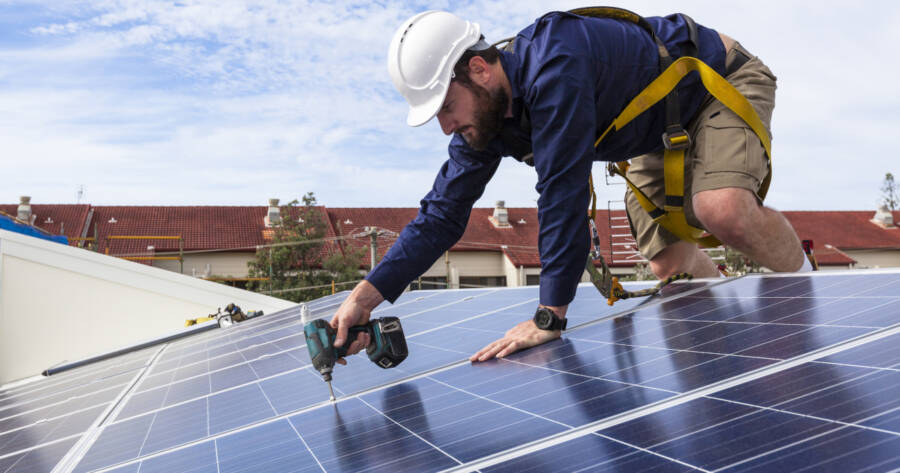Attention Australian homeowners and small business owners! If you’ve ever thought about making your property greener and more energy-efficient, now’s the perfect time to consider installing solar panels. Solar power is especially effective in Australia, thanks to the long hours of daylight. Many homeowners can store solar power in batteries during the day and use it to power appliances overnight, saving both energy and money. Although solar panels can seem expensive initially, the wide range of government grants and rebates available, paired with a steep reduction in energy costs, could mean a lot more money in your pocket. Keep reading to learn more about the incredible benefits and savings of solar panels, and discover how government grants can help you make the switch to clean, renewable energy.
Why Choose Solar Panels?
Solar panels provide several advantages, such as:
- Clean and efficient energy generation
- Reducing reliance on fossil fuels
- Long-lasting and unobtrusive technology
Governments worldwide are increasingly focused on using greener, cleaner energy sources due to growing concerns about climate change. Currently, solar panels account for just 0.1 percent of Australia’s energy consumption. The government is eager to increase this percentage as solar panels, when properly maintained, can last for a long time and generate clean energy.
Understanding Solar Panel Costs
The cost of solar panels varies depending on your location and the size of the system you want to install. Generally, a small three-kilowatt system costs around $4,000, while a 10-kilowatt system averages $9,610. Homeowners in Perth typically pay less than those in Darwin. It’s essential to shop around, get multiple quotes, and ensure your installer is approved if you’re applying for government grants.
Savings Potential of Solar Panels
The money you can save with a solar system depends on its size and current energy prices. A general rule of thumb is that a solar system can save you $400 per kilowatt of solar. Therefore, a five-kilowatt solar system could save you $2,000 per year. These potential savings make investing in solar a smart financial decision. Even if you pay for the system upfront, it can pay for itself within three years.
Obtaining Solar Panels Through Government Grants
Various grant programs and options are available to help Australian small businesses and homeowners get started with solar power, including:
- Small-scale Renewable Energy Scheme
- Feed-in tariffs
- Subsidies for energy storage and off-grid solar systems
Additionally, local grants and programs are often available to support organizations. Small business owners can find information about available grant options on the government grant finder.
Solar Grants for Businesses
The Small-scale Renewable Energy Scheme is open to small businesses, providing financial incentives to encourage solar panel installation. Instead of direct rebates, solar panel owners earn Small-scale Technology Certificates based on their energy production. These certificates can be sold or assigned for a negotiated price.
Solar Grants for Homeowners
Homeowners can also benefit from the Small-scale Renewable Energy Scheme. Many homeowners use this scheme to subsidize their solar panels’ cost by assigning the Small-scale Technology Certificates to an agent in exchange for a discount. Some companies even offer free solar panels in return for assignment of the STCs.
Feed-In Tariffs
Feed-in tariffs involve selling the energy generated from solar panels back to the energy supplier. Rates vary depending on your location, and while they are generally not as generous as STC payments, they can be lucrative over the lifespan of the panels.
Solar Hot Water System Subsidies
Some states offer solar hot water rebates or other payments, like Victoria’s Solar Homes Program and the City of Adelaide Council’s program. The ACTSmart Program also provides up to $1,200 towards the cost of solar water heaters. Contact your local council for information on programs and rebates available in your area.
Subsidies for Storage
Batteries are useful for storing solar power during the day for use at night when demand often increases. Small businesses can claim a 100 percent tax deduction for installing batteries. Additionally, some local programs help homeowners install solar battery systems, such as the City of Adelaide’s Sustainability Incentives Scheme, which offers incentives for homeowners and businesses to invest in electricity management systems and green energy.
Off-Grid Subsidies
Although the original Renewable Remote Power Generation Program has ended, homeowners in remote areas can still benefit from the Small-scale Technology Certificates program. This program can save thousands of dollars on the cost of installing a system for larger off-grid installations. To qualify for a rebate, the installation must be a complete, new system rather than an expansion of existing solar panels.
Finding Local Grants
To find out if grants are available for solar power in your area, contact your city council or state government. They can provide information on local and national programs you may be eligible for. Grants change regularly, and regional energy providers often offer their own incentives, so it’s essential to shop around for the best long-term deal.
Is Paying Full Price for Solar Worth It?
Most Australian homeowners and small business owners qualify for at least partial subsidies for solar panel systems, and some can have the full cost covered. Even if you don’t qualify for support, solar power is still worth considering.
Look for low-interest loans and evaluate the time it takes to recoup costs through feed-in tariffs. If you plan to stay in your property for at least three to five years, solar panels are likely to pay for themselves and become profitable.

